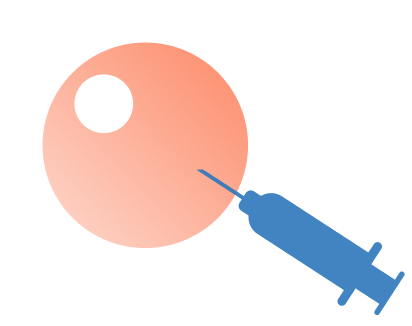Intracytoplasmic Sperm Injection (ICSI)
Intracytoplasmic Sperm Injection (ICSI) is a specialised fertility treatment that presents an alternative to IVF when one or more of the sperm parameters are below the normal range as well as for patients who have previously had IVF with very low or no fertilisation.

What is ICSI, and who is it for?

ICSI is an alternative way to IVF of achieving egg fertilisation. It is offered to patients with a male factor subfertility diagnosis or to those who have had previous poor or failed fertilisation with IVF. It can be used to overcome issues of sperm quantity and quality.
How does ICSI work?
Within ICSI, an individual sperm is identified under the microscope and directly injected into each mature egg by a clinical embryologist. When eggs are collected, they are surrounded by a cloud of cells (cumulus cells) which help to nourish and mature the egg. These cells are removed before the ICSI process to aid in the visualisation of the egg and assessment of maturity. Only mature eggs can be injected. After fertilisation, the next stages of treatment are the same as within IVF treatment, where embryos will be cultured in the laboratory and transferred into the patient’s uterus up to five days after the egg collection.
Why is ICSI important?
ICSI can help patients with reduced semen parameters have biological children and this was not possible before. It can also be used to achieve fertilisation in cases where previous IVF has been unsuccessful. Sometimes, when using frozen sperm, it is necessary to do ICSI if the sperm parameters after thawing require it even if the sperm was normal before freezing.
When is ICSI recommended?
ICSI (Intracytoplasmic Sperm Injection) is a specialised assisted reproductive technology used in cases of male infertility or when conventional IVF techniques have not been successful.
Comparing ICSI and IVF
Fertilisation rates following ICSI are similar to IVF. Similarly pregnancy and live birth rates do not differ between the two.
How successful is ICSI?
At Bridge Clinic London we pride ourselves in having a multidisciplinary team that is committed to helping you achieve your dreams of starting a family. We will give you all the support that you need at every stage of your journey. The treatment you receive will always be designed around your individual needs.
Success rates with ICSI very much depend on the age to the woman whose eggs are collected. It is important to remember that success rates can have their limitations when you compare them with your own experiences or diagnosis.
Read more about our success rates
How much does ICSI cost? ICSI treatment at Bridge Clinic London costs £5,150
This includes
- All required screening blood tests (minimum Hepatitis B and C, HIV and Rubella)
- A teaching session with the member of the nursing team to
- teach drug administration
- support you with the consenting process
- A consultation with one of our embryologists
- Baseline scan
- Stimulation scans
- Blood tests if required
- Egg collection
- Conscious sedation
- Sperm preparation
- ICSI injection of all mature eggs
- Embryo culture to the blastocyst stage (day 5)
- Embryo transfer
- Pregnancy scan if applicable
- Trial embryo transfer if required
- The use of AI algorithms to assist us in assessing embryo quality
-
If for medical reasons the clinical team recommends to freeze all suitable embryos, then the subsequent frozen embryo transfer cycle will cost £300.These reasons might include: risk of ovarian hyperstimulation syndrome, high progesterone or thin endometrium.
